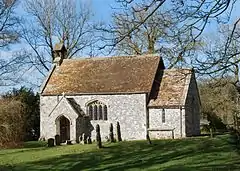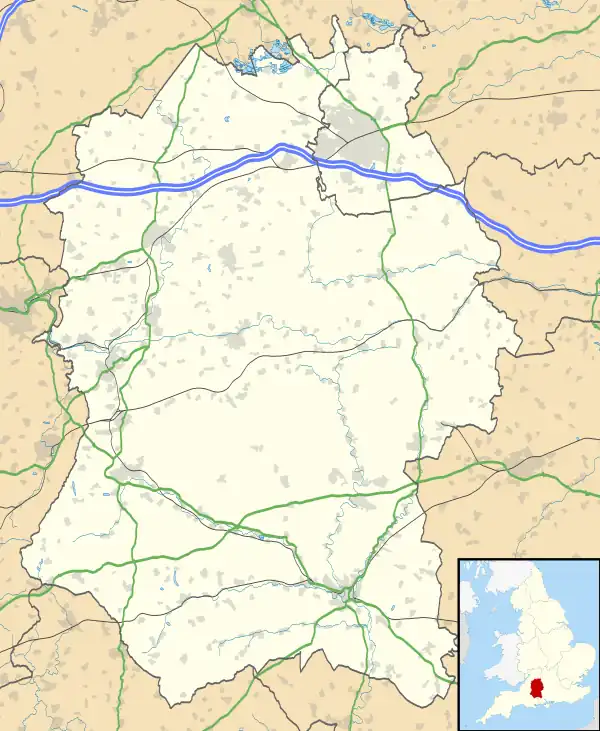| Rollestone | |
|---|---|
 | |
 Rollestone Location within Wiltshire | |
| OS grid reference | SU072432 |
| Civil parish | |
| Unitary authority | |
| Ceremonial county | |
| Region | |
| Country | England |
| Sovereign state | United Kingdom |
| Post town | SALISBURY |
| Postcode district | SP3 |
| Dialling code | 01980 |
| Police | Wiltshire |
| Fire | Dorset and Wiltshire |
| Ambulance | South Western |
| UK Parliament | |
Rollestone is a small village and former civil parish on Salisbury Plain in Wiltshire, England. It is near the River Till. Its nearest town is Amesbury, about 5 miles (8.0 km) away to the east.
For local government purposes, Rollestone was added to Shrewton parish in 1934.[1]
History
The name Rollestone was first used in the 13th century.[1]
In 1947 the Ordnance Survey map[2] showed Rollestone as a hamlet south of the A360 Devizes to Salisbury road, about 0.5 miles (0.80 km) southeast of Shrewton. As Shrewton expanded in the 20th century, Rollestone became an area of Shrewton.
Rollestone Manor was built in the 18th century and is Grade II listed.[3] As of 2015 it is a privately owned hotel and restaurant.[4]
Church
The small 13th-century Anglican Church of St Andrew is Grade II* listed.[5] It was declared redundant and is in the care of the Churches Conservation Trust.
Near the church is the former rectory, a mid-17th-century building altered in the 19th century.[6]
Rollestone Camp
Military usage of land to the northeast of Rollestone began in the early 20th century, as artillery firing ranges which were later used by the Royal School of Artillery at Larkhill Camp.
Rollestone Camp was established in 1916[1] by the Royal Flying Corps for observation balloon training. Situated in an upland area of Wiltshire, it was described by one soldier stationed there as 'a bit bleak', especially for Australians used to a warmer climate. The water froze around Christmas time, and one night the troops' corrugated iron cinema was blown away.[7]
Around this time the Amesbury and Military Camp Light Railway was extended from Larkhill to Rollestone and beyond; this extension remained in use until about 1923. Balloon-related usage of Rollestone Camp continued until 1939 when the site became a Royal Air Force Anti-Gas School, which closed in 1945.
For several months in 1980–81 the camp was used as a temporary prison (HMP Rollestone Camp) during industrial action by prison officers.[8]
For 8 months in 1988, the camp became HMP Rollestone once more when it was used to relieve overcrowding in civilian prisons. The prison housed 360 category C prisoners. The prison governor was a HMP graded officer, the wing commanders were Military Provost staff (from Colchester military prison) and the wing staff were Royal Military Police NCOs, provided by the local Provost companies in nearby Tidworth and Bulford.
The camp continues in use as part of the Salisbury Plain Training Area.
References
- 1 2 3 Baggs, A. P.; Critall, Elizabeth; Freeman, Jane; Stevenson, Janet H. (1980). "Parishes: Rollestone". In Crowley, D. A. (ed.). A History of the County of Wiltshire, Volume 11. Victoria County History. University of London. pp. 208–212. Retrieved 29 April 2023 – via British History Online.
- ↑ "Sheet 167". New Popular Edition Maps. Retrieved 25 April 2015.
- ↑ Historic England. "Rollestone Manor (1023992)". National Heritage List for England. Retrieved 25 April 2015.
- ↑ "Rollestone Manor Bed & Breakfast". Retrieved 25 April 2015.
- ↑ Historic England. "Church of St Andrew, Rollestone (1181917)". National Heritage List for England. Retrieved 25 April 2015.
- ↑ Historic England. "The Old Rectory, Rollestone (1284770)". National Heritage List for England. Retrieved 27 January 2020.
- ↑ Bullock, Arthur (2009). Gloucestershire Between the Wars: A Memoir. The History Press. p. 54. ISBN 978-0-7524-4793-3.
- ↑ "2nd Battalion The Royal Irish Rangers, Her Majesty's Prison (HMP) Rollestone Camp". The Royal Irish. Retrieved 25 April 2015.
External links
- "Rollestone". GENUKI. Retrieved 25 April 2015.
- "Shrewton". Wiltshire Community History. Wiltshire Council. Retrieved 25 April 2015.
- "Shrewton village site". Retrieved 25 April 2015.
 Media related to Rollestone, Wiltshire at Wikimedia Commons
Media related to Rollestone, Wiltshire at Wikimedia Commons